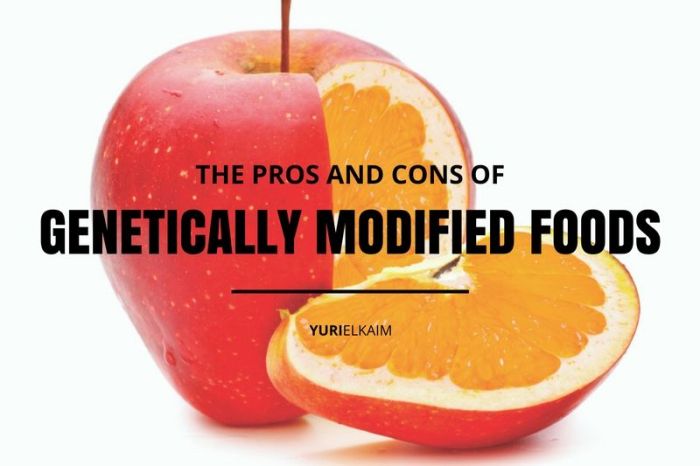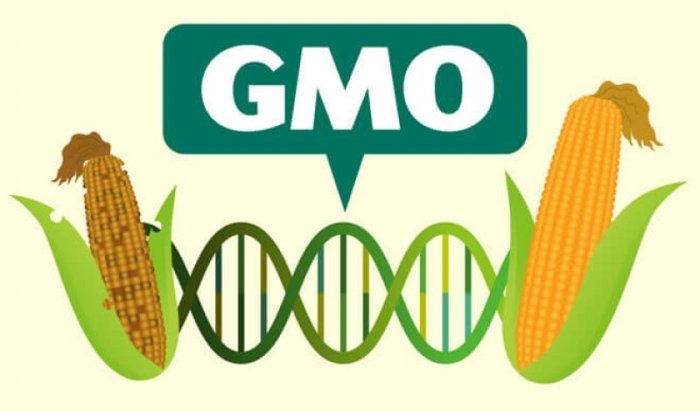Thesis statement for genetically modified foods – Genetically modified foods (GMOs) have sparked a global debate, raising concerns about their potential benefits and risks. This article analyzes the thesis statement for GMOs, examining its clarity, relevance, and supportability, to provide a comprehensive understanding of this complex issue.
The potential benefits of GMOs include increased crop yields, resistance to pests and diseases, and improved nutritional value. However, concerns about environmental risks, health risks, and ethical considerations have also been raised. This analysis will explore these arguments, aiming to provide a balanced perspective on the issue of GMOs.
Introduction

Genetically modified foods (GMOs) are foods that have had their DNA altered using genetic engineering techniques. These techniques allow scientists to change the genetic makeup of an organism, including plants, animals, and microorganisms, to give them new or enhanced traits.
The purpose of this article is to analyze the thesis statement for GMOs, considering their potential benefits and concerns, and to evaluate its clarity, relevance, and supportability.
Benefits of GMOs
GMOs have the potential to offer several benefits, including:
- Increased crop yields: GMOs can be engineered to produce higher yields, which can help to address global food security issues.
- Resistance to pests and diseases: GMOs can be made resistant to pests and diseases, which can reduce the need for pesticides and herbicides, and improve crop productivity.
- Improved nutritional value: GMOs can be fortified with essential nutrients, such as vitamins and minerals, to improve the nutritional status of populations.
Concerns about GMOs
There are also some concerns about GMOs, including:
- Environmental risks: GMOs could potentially have unintended consequences for the environment, such as the creation of new superweeds or the transfer of genes to wild populations.
- Health risks: Some people are concerned about the potential health risks of GMOs, such as allergies or the development of new diseases.
- Ethical considerations: GMOs raise ethical concerns for some people, such as the question of whether it is right to genetically modify organisms.
Thesis Statement Analysis
The thesis statement for GMOs is: “GMOs have the potential to offer significant benefits to society, but they also raise important concerns that need to be carefully considered.”
This thesis statement is clear and relevant to the topic of GMOs. It also acknowledges both the potential benefits and concerns of GMOs, which makes it a balanced and supportable statement.
The main arguments for the thesis statement include the potential benefits of GMOs, such as increased crop yields, resistance to pests and diseases, and improved nutritional value. The main arguments against the thesis statement include the potential concerns about GMOs, such as environmental risks, health risks, and ethical considerations.
Discussion and Conclusion, Thesis statement for genetically modified foods
The thesis statement for GMOs has implications for society, the environment, and the future of food production. GMOs have the potential to offer significant benefits, but they also raise important concerns that need to be carefully considered.
It is important to weigh the potential benefits and concerns of GMOs carefully before making a decision about whether or not to support their use. There is no easy answer to the question of whether or not GMOs are safe and beneficial.
However, by carefully considering the evidence, we can make informed decisions about the role of GMOs in our food system.
Detailed FAQs: Thesis Statement For Genetically Modified Foods
What is the main argument in favor of GMOs?
Increased crop yields, resistance to pests and diseases, and improved nutritional value are key arguments in favor of GMOs.
What is a primary concern raised about GMOs?
Potential environmental risks, health risks, and ethical considerations are primary concerns raised about GMOs.


